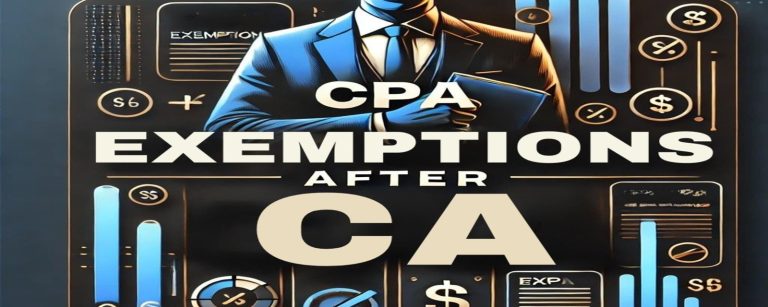The exemptions in CPA after CA are an important aspect of interest for Indian Chartered Accountants (CA) who wish to broaden their career opportunities and gain international recognition in the accounting profession. Many Indian professionals look towards the CPA (Certified Public Accountant) credential to enhance their global career prospects, particularly in countries like the United States, Canada, and the Middle East, where the CPA designation is widely valued. For CA finalists, the CPA pathway becomes more achievable, as they are eligible for paper-by-paper exemptions in the CPA exams if they score 50 or higher in their respective CA final exam subjects. On the other hand, fully qualified CA members receive complete exemptions from the CPA course, acknowledging both their academic achievements and professional experience. These exemptions significantly reduce the additional time and effort needed to qualify for CPA, making it an attractive and cost-effective route for Indian accountants aiming to expand into global finance and auditing roles.This article will explore the details of CPA exemptions after CA, including eligibility, subjects covered under exemptions, the application process, and the major benefits of leveraging these exemptions to accelerate your international accounting career.
What is a CPA?
The Certified Public Accountant, or CPA, is a universally accepted accounting designation that is conferred by the American Institute of Certified Public Accountants. CPAs are experts in areas such as accounting, auditing, taxation, and financial analysis. The CPA designation is the gold standard for those who wish to work in the United States or for multinational companies around the world.
The CPA certification worldwide is recognized to provide job opportunities in top firms and Big 4 firms. The CPA examination has four areas: Auditing and Attestation (AUD), Business Environment and Concepts (BEC), Financial Accounting and Reporting (FAR), and Regulation (REG). To sit for the exams, candidates should have 120-150 credit hours of college education, dependent on state board requirements.
Exemptions in CPA After CA
Paper-by-paper exemptions in the US CPA exams are available to CA Finalist students who receive a score of 50 or higher in their final test courses. They can bypass the relevant parts thanks to this exemption, which facilitates the certification process. It helps individuals advance in their careers more quickly and acknowledges their solid accounting background.
The full exemption from the CPA course is received by qualified CA members. They are regarded as having fulfilled all requirements and have expertise at an advanced level with professional achievements. This policy highlights the value of their credentials and opens doors to global opportunities without the need for additional examinations.
The CA intermediate students get exempted from their first two subjects, AFAE (Applied Financial Accounting & Ethics) and BRLC(Business Regulatory Laws Compliance). This exemption recognizes their past knowledge and, therefore, less burden of additional examinations. It saves them time as they progress in their learning process and allows them to follow a more direct path to obtain professional certifications.
Other Exemptions in CPA
In recognition of prior learning, exemptions during professional courses streamline the certification pathway for qualified professionals. CMA, CS, and Chartered Tax Practitioners have exclusive exemptions that require them to answer fewer exams before their certification can be achieved. The provisions aim to make such individuals’ roadmaps easier by saving time toward the advancement of their careers.
- CMA Finalist Students: CMA finalists who score 50+ in their final exam subjects receive paper-by-paper exemptions from the US CPA exams. They pass those sections. Fully qualified members of CMA are given full exemption from the course.
- Intermediate Students of CMA: Intermediate students of CMA get exemptions for the two subjects of AFAE and BRLC, hence allowing them to move further in the course.
- CS Qualified Students: CS-qualified graduates are exempt from appearing for the AFAE, Taxation Laws, and Business Laws. They can also join the institute through lateral entry into the second year of the program.
- Qualified Chartered Tax Practitioners: Chartered Tax Practitioners are exempt from the first four papers. So, they just have to pass the remaining four papers and qualify for lateral entry into the second year of the course.
| Category | Exemptions | Details |
| CMA Finalist Students | Paper-by-paper exemptions in US CPA exams. | Must score 50+ in final exam subjects. |
| CMA Intermediate Students | Exemptions for AFAE and BRLC. | Allows progression in the course. |
| CS Qualified Students | Exempt from AFAE, Taxation Laws, and Business Laws. | Eligible for lateral entry into the second year. |
| Chartered Tax Practitioners | Exempt from the first four papers. | Must pass the remaining four papers. |
Benefits of CPA Exemption
The combination of CA and CPA qualifications opens up opportunities for professionals looking to gain recognition globally. It offers benefits like faster career growth, cost-effective pathways, and versatile roles in the CPA certification, which complement the expertise of CAs and open doors to prestigious positions in international markets.
- Faster Career Progression: The CPA certification is the recognition that brings you recognition in global markets and lucrative job opportunities with faster promotions. CA and CPA qualifications make you highly sought after by multinational companies.
- Cost-Effectiveness: If the CA qualification fulfills the requirements for the education credit, additional coursework will be avoided, thereby saving time and money.
- Knowledge Advantage: Already, they know accounting, auditing, and taxation. These factors make studying for the CPA more manageable as it reduces learning time.
- Job Opportunities: CPAs hold prestigious roles like financial analyst, tax consultant, auditor, and advisor with multinational companies. The Big 4 accounting firms seek only qualified CPAs to serve in an international assignment.
- Career Versatility: The CPA certification can give you international career versatility on your resume, as it can allow you to take on international taxation roles, US GAAP compliance, and global financial reporting.
How to Apply for Exemption?
Applying for exemptions in CPA after CA or meeting eligibility requirements is a straightforward process.
- Credential Evaluation: Provide academic transcripts, CA qualification, and experience certificates to the NASBA or WES credential evaluation agency. They will analyze your education and credits on US standards.
- Choose a State Board: There are varying eligibility requirements for a CPA in every state in the US. Choose a state board that accepts your CA qualification. For many Indian candidates, states like Colorado, Illinois, and New York are popular.
- Complete All Educational Credits: If your audit does not fulfill 150 hours of credit, complete the difference by taking the remaining credits of short-term courses in US GAAP or tax.
- Register for the CPA Exam: Apply through your state board to get the Notice to Schedule, NTS, and to appear in the CPA Exam.
Prepare Strategically: Strategize for preparation-prepare sections that would require you to gain some additional knowledge in areas like US taxation and business law; FAR and AUD, for which you can apply your CA background.
Exemptions in CPA FAQs
Are Indian CAs exempted from CPA exams?
Indian CAs do not receive direct exemptions in CPA exam sections but fulfill most educational requirements.
Is CA Inter-exempted in CPA?
CA Inter candidates may partially fulfill CPA educational credits but must complete additional coursework to meet requirements.
Can US CPA exemption be availed for Indian qualifications?
Yes, Indian CA qualifications are accepted but exemptions depend on individual state board appraisals.
How does CPA benefit Indian CAs?
CPA brings international acceptance, increases earning capacity, and offers exposure in international finance and accountancy.
Which of the states are best suited for Indian CA aspiring to become a CPA?
Indian applicants are more attracted to Colorado, New York, and Illinois, which generally acknowledge CA qualifications.


